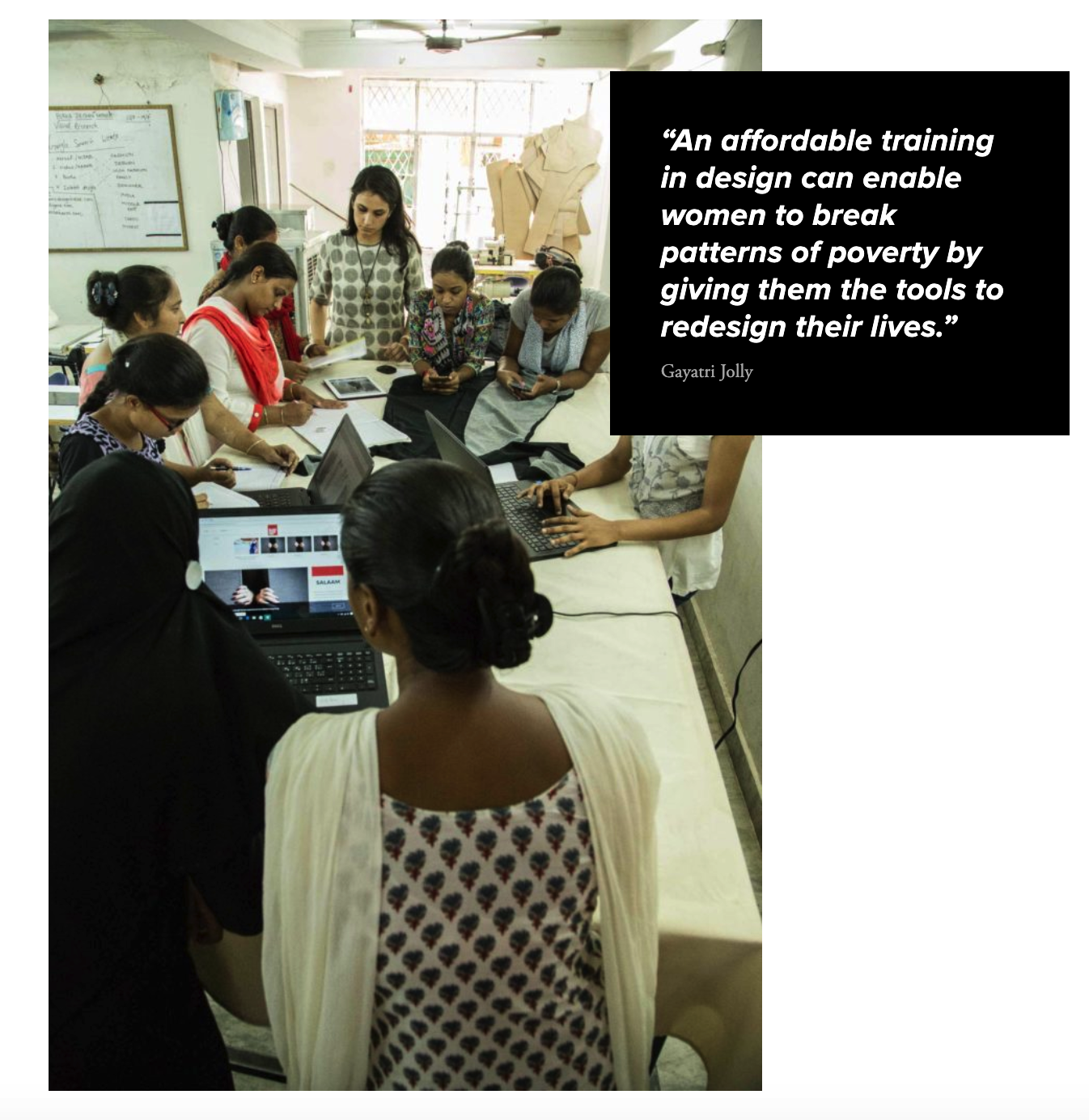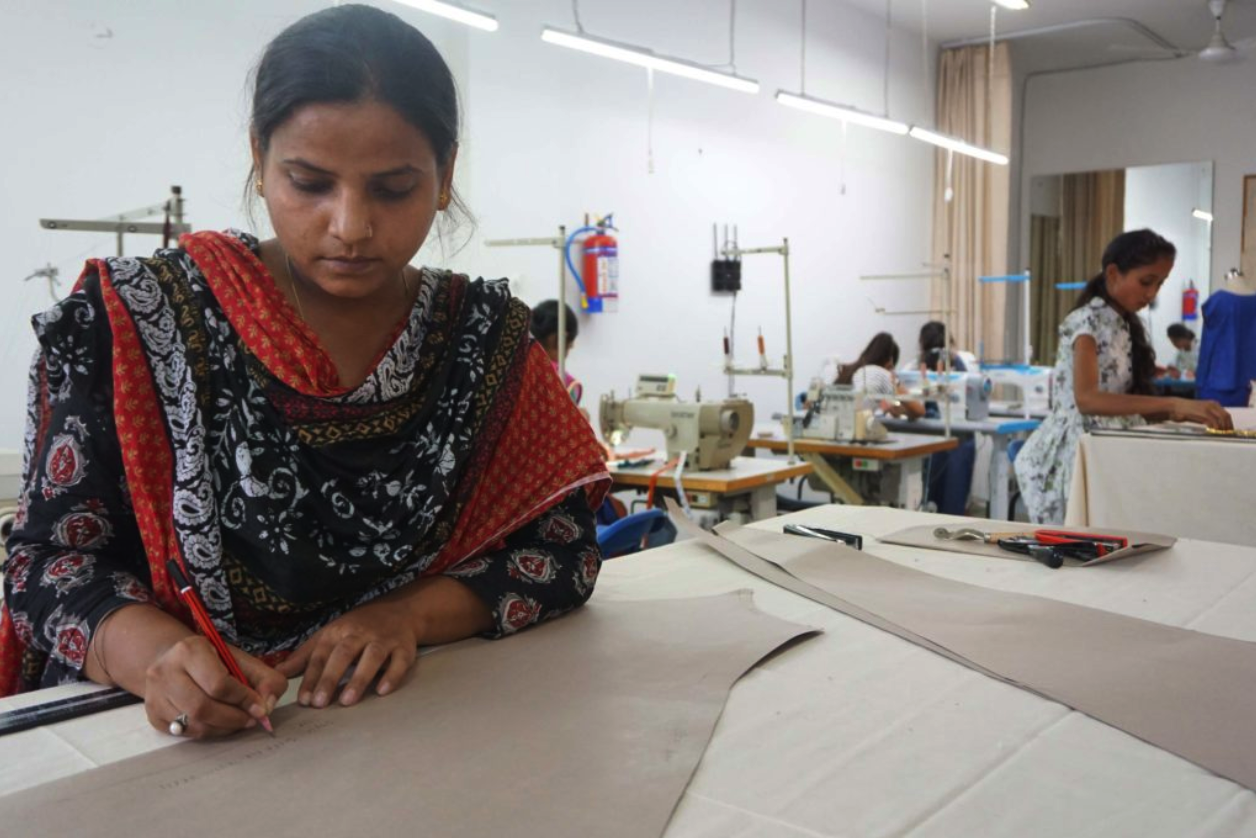A Fashionable Rethink of Women's Empowerment
By Naomi Menezes - International Representative (India)
MasterG is a social enterprise based in Delhi that enables women from low-income communities to question the baggage of societal norms, and establish an identity for themselves through the vocation of fashion design. We caught up with Gayatri Jolly (founder of MasterG) to interview her about how the organisation’s initiatives are reshaping the skill-development sector.
What led you to train rural women to become Masterjis?
In India, Masterji is the title given to a pattern maker. For years, this role has solely been taken up by men. In the garment manufacturing sector, women are only considered for low profile jobs that can be done by any unskilled person. I wanted to change the narrative and provide women with a platform to be pattern makers. MasterG was born with this mission in mind.
All these years, women haven’t had the opportunity to learn these skills. Our all-women factory in Okhla stands testimony to the fact if given an opportunity, women can excel in the art of pattern making. Since its inception, the number of orders and repeat customers has only been growing, along with the appreciation we receive from our satisfied customers for our high-quality garments and timely delivery.
Also, the potential of young women is not utilised completely in our country. They have very few opportunities to express themselves. We need an ecosystem where training is not just about skill-development, but the development of individuals so they can realise their potential. The dignity and self-confidence acquired at MasterG strengthens the women to question the patterns and systemic barriers in their homes.
How does your organisation address the gaps in skill training?
The current skilling-programs and schooling systems do not inspire young people to be curious and be design thinkers. Using design as a medium, MasterG is giving women the tools to think for themselves and question the expectations that have been set upon them by society. I am deeply inspired by psychologist C R Snyder’s framework on hope and it has helped us in articulating our vision for women masterjis.
We believe that hope is like a muscle that needs to be strengthened through a combination of goals, pathways and agency as described by Snyder. Here’s how we’ve interpreted the framework:
1. Goal, or dream needs to be set in the framework of a healthy learning environment, which takes place at our training centres
2. Pathway, is a reiteration of where the girls are headed because of the multi-pronged training
3. Agency is the ability to earn a living through the skills and negotiate terms with the family to work for the first time in their lives
What approach has MasterG adopted to empower women?
MasterG has a three-pronged all-women ecosystem that comprises apparel design and fabrication training program, contract manufacturing team and an in-house fashion brand called Heimat. Our training modules are designed to help women learn not only the art of creating garments but more so, the art of questioning traditional design and silhouettes to create something new.
Women learn design, pattern making and sewing over the course of a year. This also makes them think and become comfortable with the idea of questioning patterns in their lives that are holding them back. Once they overcome their personal and social barriers, earning a livelihood using the acquired skills becomes possible because these factors are not hindering their progress any longer. In most cases, the barrier to a dignified livelihood is the mindset of their families and society towards it, rather than the lack of skill itself. Therefore, unlearning existing conditioning is something we immensely work on to empower these women.
So far, what is the impact of MasterG’s training programs and other initiatives?
The training programme has impacted the lives of many women. After the training program, we hire some of the women to work for our in-house brand. Some of them move on to become entrepreneurs themselves and set up their own businesses thus becoming job creators, while others secure jobs with other designers and export houses. We have 3 training centres in Delhi and Haryana. We export garments to US, UK, Thailand, Hong Kong and other international markets from our factory in Okhla which is run by the women graduates of our training program.
In 3 years, we have trained 420 women with 90% job placement and 100% livelihood generation (as of October 2018). Of these:
418 women have access to safe social space where they can express and discover themselves and question existing societal norms
More than 400 women are now comfortable navigating the city and leaving their homes by themselves
317 women felt that they now have more dignity in their homes and are able to participate in family decision-making
What advice would you give to fellow social entrepreneurs working in the skills development and education domain?
You should be prepared to make the most of an opportunity and have faith in your abilities. You can work your way up with the right attitude. I would like to highlight the following:
1. Be agile and ready to pivot quickly when something does not work
2. Inculcate a strong support system of cheerleaders around you
3. Listen to advice but don’t underestimate your gut feeling and inner voice, and eventually go with what you believe is right



